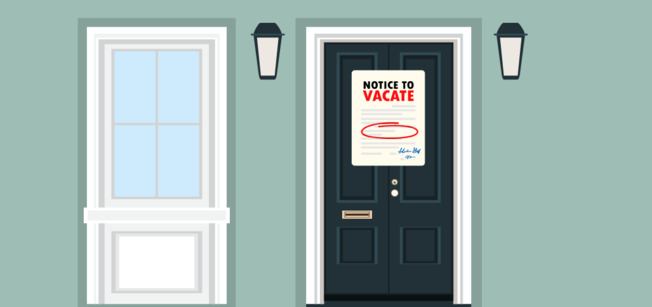
How to Get Out of a Lease
While tenants generally intend to reside in their apartments for the duration of their lease agreement, breaking leases isn't all that uncommon. Unforeseen circumstances such as a new job, relationship change, or bad roommate situation may require a tenant to end their lease term early. However, ending your tenancy early can end up costing you.
In this guide, we walk you through getting out of a lease — with tips on how to avoid breaking a lease, as well as information on what to do if you have no other choice.
What Happens When Tenants Break Their Lease Early?
While there are some extenuating circumstances when a tenant can break a lease without penalty, terminating your lease early due to common reasons such as a new job, a roommate conflict, an engagement, or a breakup can be costly.
The Consequences
Here are some specific consequences you should prepare for if you break your lease early:
- Court litigation: If you're not in good standing regarding your rent payment history and you can’t come to an agreement with your landlord, prepare for the possibility of being taken to small claims court.
- Credit score: If your landlord or property manager reports your unpaid debt to credit bureaus, your credit score could take a hit, impacting your ability to secure a new rental agreement or loan.
- Remaining rent: Depending on your rental agreement and state laws, you might be required to pay the entire month's rent for every month remaining on your lease. How many months’ rent you must pay can vary.
- Extra fees: Your rental agreement may specify additional early termination fees above and beyond the remaining months’ rent in the event of early lease termination.
- Security deposit: Depending on your rental agreement, breaking your lease early might result in your landlord not returning your security deposit.
- References: If you leave a property on bad terms, it can make renting a new place more difficult. Renters depend on their previous landlords or property managers for references when they’re trying to sign a new lease, but if you don’t see eye to eye, you may not be able to count on them for a good reference. Worse, they may even go so far as to discourage someone else from renting to you.
The Steps for Protecting Yourself During Early Lease Termination
If you must break your lease, there are some steps you can take to help minimize the consequences.
1. Understand the terms of your rental agreement. Your rental agreement should spell out what happens if you break your lease early. Look for key phrases like "sublet," "subletting," "sublease," and "early termination" for details. For example, you may be permitted to sublet your apartment to cover the remainder of the lease. However, some rental agreements prohibit renters from subletting. You may also be required to submit a written notice in the form of a notice to vacate letter if you wish to leave before your lease ends. Note that this can also be a requirement when you terminate your lease at the end of its term. And, even when not formally required according to your lease agreement, a written notice to vacate letter is highly recommended.
2. Communicate with your landlord or property manager respectfully. Transparency is critical when you must change plans and vacate early. Your landlord deserves to know your intentions to leave the rental unit as soon as possible. In advance of giving your official notice in writing, have a face-to-face conversation with them or, if that's not possible, email or call them to give them a heads up. Being open and honest about the situation prevents them from being caught off-guard when you provide your written notice to vacate. Who knows? If you give them enough notice and time to find a new tenant, they might be more likely to be sympathetic and let you vacate without penalty.
In addition to submitting a written notice to vacate, we recommend documenting all correspondence from the moment you start communicating about your intentions to break the lease. Ask your landlord or property manager to confirm all discussions, especially those about money, in writing. That way, if legal action is taken and you end up in court, you have written proof of your actions and communications on the topic.
Hopefully, if you cooperate to the best of your ability, remaining respectful and helpful throughout the process, you can avoid the cost of legal advice and representation. Remember, anything you can do to help appeal to prospective tenants or find a replacement tenant can go a long way to maintaining your relationship. The goal is to remain on good enough terms whenever possible so that your current situation won’t negatively impact your reputation and future lease agreements.
3. Help your landlord or property manager find a new tenant. Your lease agreement might require you to pay lease penalties above and beyond the remaining months' rent. You may be able to curb those costs by finding a new renter to either re-rent or sublet your apartment. Some state landlord-tenant laws require tenants to continue paying rent until the landlord can fill that rental unit with a new tenant. Look over the rental agreement, determine which fees you must pay, and set up a payment arrangement with your landlord as soon as possible to avoid litigation or other costs from accruing.
4. Don’t forget the walkthrough. Even if you need to vacate the rental immediately, don't forget to do a walkthrough with your landlord or property manager the day you move out. Take pictures or videos and document the rental unit's condition once you’ve removed your belongings. If the landlord can prove that you damaged the rental property or left it unclean, that could result in negative consequences.
How to Get Out of a Lease Without Penalties
The easiest way to avoid any negative consequences is by not breaking your lease at all. A lease is a binding contract, and reneging on it can end up costing you and your landlord. So, if you don’t want any bad blood or extra bills, consider finding a subletter or a new tenant willing to do a lease takeover instead.
5 Reasons Tenants Can Break a Lease Without Penalty
However, if you must break a lease, there are a handful of circumstances in which you wouldn’t be subject to any penalties:
1. Illegal Rental
If a unit is being rented illegally, it is the tenant’s right to break their lease without penalty. State laws indicate how tenants can broach this topic, including learning how to recoup a portion of the rental payments they remitted throughout their lease.
Signs your apartment might potentially be illegal include:
- The price is significantly lower than competing rentals.
- Its location is in an attic or basement.
- You don't have to pay utilities, or there's no separate meter for electricity.
- The landlord or property manager asks for cash payments.
- There's only one egress, which violates fire codes.
- There's no kitchen or bathroom.
If you suspect your apartment may be an illegal rental, reach out to a local attorney for legal advice.
2. Lack of Rental Unit Maintenance or Inhabitable Conditions
It's the landlord's responsibility to ensure their tenant's rental units meet certain standards of habitability and have:
- Clean common areas
- Access to clean running water and heat without disruption
- Garbage removal
- Health and safety code enforcement
- Maintenance inside rental units and on the property as needed
Specific conditions — like mold or inadequate waste removal — are detrimental to a tenant's health and can be cause for them to vacate the property without penalty.
3. Tenant Harassment or Illegal Entry
Tenants can break a lease without penalty if the landlord or property manager harasses them in any way or if the landlord or property manager enters the apartment illegally. One example of harassment is when a landlord uses aggressive behavior to intimidate a tenant. Landlords must give tenants 24 hours' notice or more before entering an apartment and have a legal reason for doing so. Examples of legal reasons for entry include rental unit inspections, repairs inside the apartment, and showings to a new tenant.
4. Active-Duty Military
If deployed for military service, military professionals often have no choice but to get out of a lease early, and that's when the Servicemembers Civil Relief Act (Benefit and Protection No. 5 – Residential apartment lease termination – 50 U.S.C. § 3955) comes into play. Active-duty military professionals must provide their landlord with a copy of their military orders showing that the active-duty assignment or deployment is for a minimum of 90 days.
5. Domestic Violence
If you need to escape a domestic violence situation, early termination might be your only option. In some states, a victim of domestic violence must give their landlord at least 30 days' notice and furnish them with a copy of the order of protection. According to the Housing Rights of Domestic Violence Survivors, landlords must permit early lease termination without requiring victims of domestic violence to pay rent for the remainder of the lease agreement.
The Bottom Line
If you’re wondering how to get out of a lease early, the answer depends on the circumstances, state and local laws, and the terms of your lease. Let your rental agreement be your guide; there will likely be an early termination clause that dictates next steps. Hopefully, our guide will also help you understand your rights as a tenant and communicate proactively and respectfully with your landlord or property manager. If you follow the above steps, you may just be able to break your lease without breaking the bank.
Top cities
Atlanta Apartments
1,999 apartments starting at $600/month
Austin Apartments
4,949 apartments starting at $600/month
Baltimore Apartments
1,472 apartments starting at $500/month
Boston Apartments
3,499 apartments starting at $940/month
Charlotte Apartments
2,903 apartments starting at $450/month
Chicago Apartments
4,012 apartments starting at $450/month
Dallas Apartments
5,609 apartments starting at $604/month
Fort Worth Apartments
2,193 apartments starting at $600/month
Houston Apartments
4,504 apartments starting at $590/month
Las Vegas Apartments
1,081 apartments starting at $704/month
Los Angeles Apartments
11,535 apartments starting at $625/month
Miami Apartments
544 apartments starting at $1,000/month
Milwaukee Apartments
928 apartments starting at $465/month
New York Apartments
4,118 apartments starting at $488/month
Oakland Apartments
608 apartments starting at $885/month
Orlando Apartments
842 apartments starting at $825/month
Philadelphia Apartments
3,657 apartments starting at $550/month
Phoenix Apartments
4,153 apartments starting at $599/month
Pittsburgh Apartments
1,223 apartments starting at $600/month
Portland Apartments
2,519 apartments starting at $599/month
Raleigh Apartments
1,367 apartments starting at $750/month
San Antonio Apartments
3,925 apartments starting at $525/month
San Diego Apartments
2,960 apartments starting at $650/month
San Francisco Apartments
436 apartments starting at $675/month
San Jose Apartments
405 apartments starting at $1,300/month
Seattle Apartments
3,623 apartments starting at $450/month
Tampa Apartments
1,078 apartments starting at $800/month
Washington DC Apartments
2,878 apartments starting at $745/month


